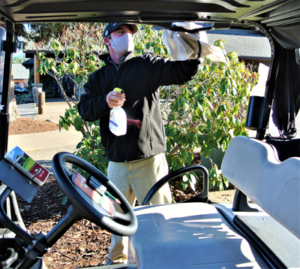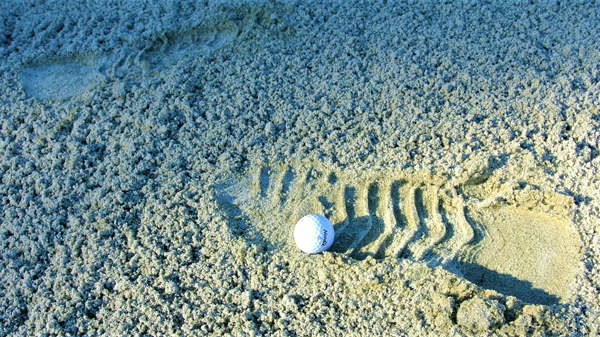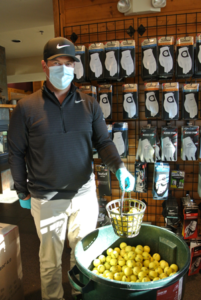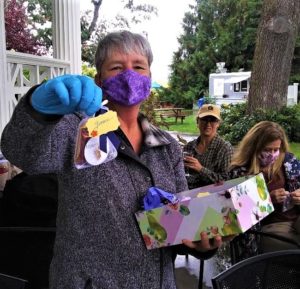Coming Clean on COVID on the Course
by Yvonne Pepin-Wakefield
The unexpected boom in the game during the COVID-19 pandemic has caused golf course operators to be proactive in keeping golfers safe.

As the virus gained momentum, golf courses around the country adapted to restrictions and implemented safeguards…..and saw an influx of regular and new players, some of them as green as the fairways.
Seasoned golfers amped up their tee times. Parents and grandparents introduced youngsters to the game. Newbies gave golf a swing, and for some it was a time to enact stunts from comedy golf movies (for one player, it was a time to witness and to learn it is a “thing” for a man to drop his pants if his tee shot doesn’t clear the forward tee box).
“People who never played the game before came out and slowed down play because they did not know the rules,” said Tyson Jacobs owner/manager of Indian Creek Golf Course in Hood River, Ore., during the beginning of the lockdown. “Some got lost on the course and jumped holes. Marshalling became more involved.”
Everyone was tolerant during the weeks of full lockdown, but Jacobs recommended that someone who is brand new to the game should talk with their local PGA golf professional about lessons and golf etiquette before heading out on the course. “This will make their round much more enjoyable.”
Indian Creek is a public course, and like others around the country works overtime implementing new COVID-19 protocols and complying with local and state guidelines.
Along with masking indoors and the six-foot social distancing, these measures also include washing and sanitizing carts, and cleaning range balls with bleach.
A two-inch slice of a plastic PVC pipe is placed in every cup and the pin is left in to minimize touch points. Rakes have been removed from bunkers and new flexibility from USGA rules allow a golfer to take a ball out of a footprint in the bunker and replace at the nearest point of relief.

Gone too are the traditional high-fives or handshakes during or at the end of a game. Players tap putters or air high-five instead.

Armanda Mason, RN, is an infection preventionist and also treasure for the Indian Creek Women’s Golf Association. “Let go and adapt,” she advised when the 2020 season was started in June rather than April, which gave the league time to develop the protocols to ensure safe play during the pandemic.
Overall, the association promoted four guiding principles which framed everything they did throughout the season: Minimize touching; follow the science; wear masks when not on the course; and be willing to let go of the old ways of doing things and open to new ways.
“During and after the pandemic lockdowns, we needed to alter what happened after a round was completed,” Mason explained. This meant no inside social gatherings after games; Venmo was used for no-contact payment when collecting dues and fees; before and after play, money and scorecards were collected in plastic bags and left for at least 72 hours (the science indicated that any residual virus left in a bag would have dissipated by then).
During the club championship, players were kept in the same flights to eliminate any touching of a marker for KP or LD. The season finale was held outdoors, which allowed for people to order their own food in advance and awards and gift bags were pre-assembled and handed out by a person wearing gloves.
McNary Golf Club in Keizer, Ore. is also adapting to pandemic-driven regulations. “It depends on where we are with the Governor’s COVID-19 regulations,” says Chip Sullivan, PGA Director of Club Operations. The club has removed high-touch points, including sand bottles in carts and turning off water fountains.

“The most frustrating thing is enforcing mask wearing,” he says. “That hasn’t gone over the best. It’s just a matter of enforcing the rules.”
As with Jacobs at Indian Creek, Sullivan experienced a surge of beginner-golfers, and staff tried their best to “gently guide” them into the sport by informing them of etiquette, course layout and use of equipment. Despite having some “spirited” first-timers crash and total one of the club’s carts, Sullivan is optimistic. “The big thing is golf is booming. It is one safe haven people have.”
Yvonne Pepin-Wakefield is an artist and author with a doctorate in Human and Organizational Systems, all of which have nothing to do with her performance on the golf course. She recently took up the game and actively seeks pastoral courses in out-of-the way places. The Dalles Country Club, at which she is a member, is only a few miles from her home and studio built on the Columbia River in The Dalles, Ore. View her work at yvonnepepinwakefield.com.





